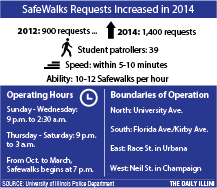SafeWalks to release mobile app in late February

Feb 18, 2015
Last updated on May 10, 2016 at 09:39 p.m.
Students walking home alone at night, fearful of walking by themselves but not comfortable calling the University police department, will soon have a new alternative.
SafeWalks, a program sponsored by the University police department that provides student patrols to escort students and faculty around campus, is set to release a new mobile app in two to three weeks, according to the University police department.
The smartphone-based app will provide a simpler way to request SafeWalks than calling the University police line.
Ryan Johnson, security coordinator for the Division of Public Safety, said when students walk at night in pairs or with a group, their chances of being involved in a critical incident or becoming the victim of a violent crime are greatly reduced. Most of the time students become the target of a crime just because they are outside alone, he said.
Get The Daily Illini in your inbox!
“Our goal is to make it easier for students to connect with our SafeWalk program,” Johnson said in an email. “Many times, students might be underage, intoxicated and don’t want to call the police department, fearing they will get in trouble. International students speak poor English and may not understand phone conversation. This app establishes a swift and convenient method for them, so they don’t have to walk alone at night.”
Johnson believes that with the launch of this new app, more students will request a SafeWalk. The program has recently hired more student patrollers to ensure that every requester can get a pair of student patrollers in time.
The SafeWalk app will support both iOS and Android systems, and directly connect students and faculty who request the service with a SafeWalk student patroller. Initially, users will have to register with their net ID, name and phone number, which will be stored for all future requests.
The app is connected to the GPS of the user’s device, so the police department can immediately pin students’ current location on campus after they have requested a SafeWalk. A student patroller from SafeWalks will then call and confirm their request and current location. Two student patrollers are driven to the location to begin their SafeWalk escort.
The app was put into development six months ago with minimal funding and resources to design, create, promote and publish, said Johnson. Michael Hao and Jeffrey Huang, sophomores in Engineering, are developing the app’s Android and iOS verisons, respectively.
“The most difficult part was just getting over a learning curve,” Hao said. “There is definitely a lot of new things to try to get yourself used to writing an application like this. I honestly say that I work 15 to 20 hours a week just working on its bugs and features.”
To brand and license the app and publicize it, the police department collaborated with the Office of Technology Management and other departments to make sure it meets all the legal requirements to be an official University app.
Student Patrol Officer Taylor Franzen, senior in LAS, has assisted with the promotional and marketing concepts, and is the only female supervisor in the department.
“It is a male dominated field, but girls can also do this; in my mind it makes no difference,” Taylor said. “I hope with this app, more people could know that there is this kind of service, that there is another option to help them get home safe. We are here. We are all protective people who can make you safe.”
Franzen and other members of the Safewalk team believe this will be the first smartphone app of its kind for universities across the nation.
Yi can be reached at [email protected].





